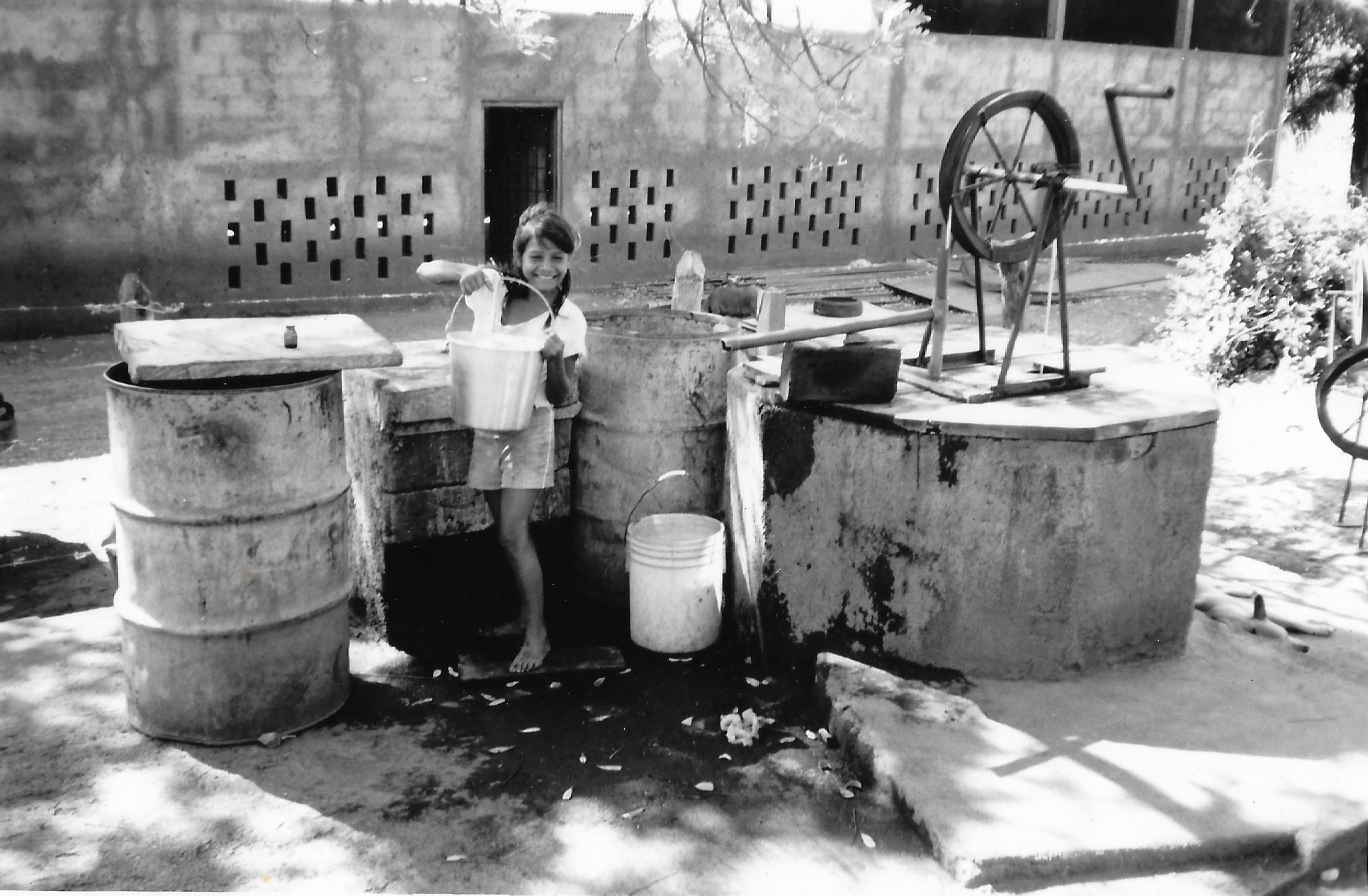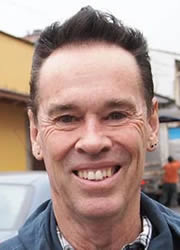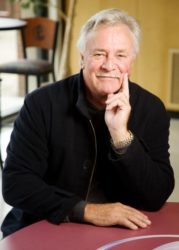featured photo- the Nicaraguan Rope Pump Project
PART 2: Sabbatical and Nicaragua 1989-90
Michael: There was a fundamental change in thinking that set you on a path to Nicaragua and Mexico that deviated away from the endless paper about ‘aims’ of education as the result of some truth calculus. I think this also coincides with changes of yourself, about what you wanted to do and your dissatisfaction with the move to neoliberal universities. But you had already made the change after the motorbike accident where you badly injured your leg. I want to tap into the passion that you had in those days that simultaneously indicated room for hope and a desperate need to change society through education that moved beyond the game of professional philosophy that was largely content to clean up the language of educational theory, a project that as it turns out was largely a class project of learning to speak properly, figuratively ‘with the right access’. And I think there were important matters of temperament and sensitivity that allied you to Latin America … new world Spanish, CIA activity everywhere in supporting juntas. There was also the romance of revolutionaries in Cuba and beyond. It was a different world from Canterbury or Auckland in the 1970s even although anti-Vietnam student politics and Mao had made a big impression in NZ.
Colin: For much of the 80s the Nicaraguan Literacy Crusade with its links to a Freirean philosophy of education provided a major academic focus for me. It also opened up the possibility of a kind of praxis that I yearned for. There was money to be raised for projects, and that got me back into my first serious political engagement since the 1981 Springbok tour protests. I also joined a political party and a group of us formed a Nicaragua support group. I visited Nicaragua and Cuba, and made valuable contacts in Nicaragua. The New Zealand government gave us generous subsidies for money raised for Nicaraguan projects — notably for projects involving water and children’s health. And it gave me a new focus for my writing: concrete cases for the view of functional literacy that I had begun arguing for. The adult basic education program that followed on from the Nicaraguan literacy crusade aimed to offer opportunities to adults who had missed out on schooling, to refine their literacy and participate in classes that grounded basic skills and knowledge in a context of application to daily life as active members of local communities trying to improve living, health, sanitisation, etc. conditions.
Which, of course, brought on the US-backed Contra War, which was actually a terror campaign that sapped resources, destroyed health centres, and maimed and killed thousands of young people. Writing and speaking as much as possible about these matters became a major activity for me, and I was able to develop courses at the undergraduate and Masters levels that looked at literacy and education more generally within societies that were trying to pursue non capitalist-consumer approaches to economic and social development. I was interested in the broad idea of education as a praxis of keeping “the words and the world together” in ways that humanize us in Freire’s sense of the concept. It was, of course, easy enough to find shortcomings in initiatives like Nicaragua’s Adult Basic Education program, but for me the main point was that there were people trying to put learning for marginalised social groups on a praxical footing, and that got my attention.
Also, of course, as you have noted, I was drawn to Latin America temperamentally and in terms of sensibility. I had never subscribed to rationales for warmongering like the domino theory, and had a very strong belief in the sovereignty of nations to forge their own paths. It wasn’t a matter of reading Che or anything like that. It was closer to home. I knew that rich countries exploited poor countries, just as rich people often get rich by exploiting poor people. I knew that prices, like wages, were pegged to the interests of those who had the greatest power to do the pegging. I simply found that offensive, and still do. It was less about ‘theory’ and more about an intuitive sense of fairness. For sure, I had some theory as well, but the prime movers were temperament and sensibility. Some of this, doubtless, had to do with the fact that when I was young I had wanted to be a carpenter, but my father said that no son of his was going to be a carpenter — long hours, hard work, low pay. That simply didn’t make sense to me, and where I saw micro and macro nuts and bolts at work to create such unfairnesses I wanted to oppose them.
And, of course, once I had spent some serious time in Latin America the ‘ways’ got under my skin as well. I was eligible for a long sabbatical, and in 1989 was granted my wish to spent the best part of 18 months living in a peasant community in Nicaragua — a co-operative that had been involved in building the hand operated pumps (the “Nicaraguan Rope Pump“) that had been a project our support group had funded for some years – see featured photo.
Michael: That must have looked like an ‘interesting’ proposal for a sabbatical for someone employed as a philosopher of education so far as the leave committee was concerned.
Colin: There is something very important for me in this — what I think of as “the best of the university” in terms of collegial support. At a time when the university was in the early grip of the neo-liberal ‘squeeze’ the sabbatical leave committee not only granted me a long sabbatical — on the basis of what I had published in the preceding years. They allowed me to do it mostly living within a Nicaraguan peasant community, with no formal connection to a university, and only a tenuous prospect of being sponsored by a research institute where I had the name of a person to contact when I arrived. As you may recall, Michael, for some years leading up to my application I had used the university’s internal mailing system multiple times for fundraising. Everyone with a name in the university’s phone directory would receive a short blurb about a project and an invitation to make a donation if they wished. The responses were always heartwarming, and as much as $5000 would come in at a time. With the government’s 3-1 subsidy an appeal could be worth $15,000 –20,000. The money was used to build heath posts, health centres, support women’s initiatives, and provide materials to build the Rope Pumps. In my leave application I said I would be staying on a co-operative that produced rope pumps. Everyone knew I was not going to be sitting in a library. Whatever else was happening to and in the university at the time, denying me an activist academic sabbatical was not part of it.
Michael: Did you visit any universities on your sabbatical?
Colin: Besides going to Nicaragua I had two trips to the US where I ‘did’ spend time with academic colleagues in universities. This was exciting and disruptive. At Madison, Wisconsin with Mike Apple I got my first experience of a Research 1 university research culture, with a Grad school and the buzz that comes from a mass of top-flight graduate students. On one of the flights from LA to Madison I found a magazine someone had discarded. It featured an article on “the rise of the underclass in the US”. I tossed the idea around with people I encountered, and used the state of the art libraries to read as much as I could in the time available. By the time I arrived in San Antonio for a week’s rest I was buzzing so hard I holed up in a Motel 6 and wrote two articles — an experience I’d never had before and one that at the time I quite liked.
And I had two sojourns with Peter McLaren, whose generosity knew no bounds. He introduced me to possibilities and ways of doing things I had never experienced before.
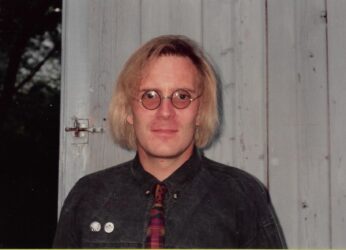
Peter McLaren
On my second trip I arrived early in the morning after 24 hours of flying and layovers. Peter just said, “Hey, we have to do a book on critical literacy”. We talked for a bit and I said “I have an idea. I know all these people who are coming at the broad theme of critical literacy from a kind of left-wing activist angle, and you know all these people working from post structuralist and postmodern perspectives. Why don’t we bring these perspectives to bear?” We agreed it might work. So before sleeping Peter went off to think of a list of possible contributors from his perspective. I did the same. We met, and went through the lists. I went upstairs and put together a working title: “Critical Literacy: Politics, Praxis and the Postmodern“. And I threw a quick rationale, market/audience, list of contributors, and the other stuff around it, gave the copy to Peter and went to bed. First thing next morning Peter rang me and said “Priscilla’s on the phone and wants to talk”. I had no idea at that stage who Priscilla was. In the course of the conversation I found out exactly who she was, and she ended the conversation saying, “This sure sounds like a SUNY book”. Inside a day of arriving we’d conceived and pitched a book and had a contract on the way. That was an experience I hadn’t had before.
Michael: The experience of living in the campesino community must have been very different. How did that go?
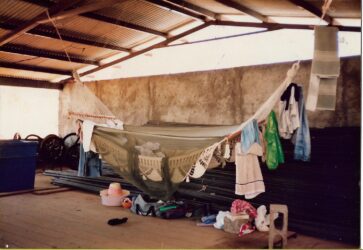
Colin: I literally swung a hammock in a covered open space and washed out of a bucket. I had clothes, cash, a Brother word processor, notebooks, two cameras. A recording cassette Walkman, a bag of batteries, some clothes, toiletries, and not much else — as you can see at ‘sabbatical HQ’.
Most days I spent working alongside peasant men and women in their everyday routines. These including plaiting cotton to make heads for mops (the handles were also produced on the co-op).
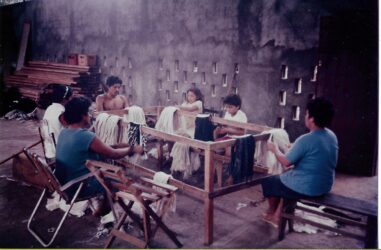
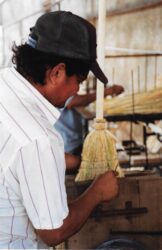
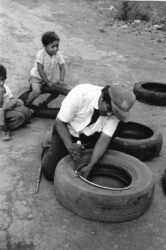 And cutting the walls out of old tyres for the rope pump wheels
And cutting the walls out of old tyres for the rope pump wheels
One night I worked with Pedro to ‘design’ and build a coffin for a month old infant whose parents had carried their dead child to the co-op because they knew there was timber there, and asked if we could make a coffin. They had arrived around 10pm. The law said the body had to be in the ground within 24 hours. We measured the infant and sketched the plan in the dust using a stick. We trimmed the timber on a machine — a buzzer and circular saw combo — that our project funds from New Zealand had been used to purchase. The infant’s father hitchhiked to Managua, 30 kilometres away, to find varnish for the coffin. We finished the coffin at 4am just as the father returned with the varnish. He took the coffin and the varnish and went home to finish the job. The funeral was at midday.
I went on three-day vaccination jornadas with nurses from the local community. I was the mule, and carried the polystyrene chests that kept the vaccines cold in ice. We would go from humble dwelling to humble dwelling. I visited peasant homes that were no more than hovels constructed between trees, using branches, sheets of polythene, scraps of corrugated iron for a roof weighted down with trashed vehicle tiles. In every single home we visited — dirt floors, holes for windows, dust-blown makeshift shelters, often — someone would bring out a container — an old tin, a small box — in which were the perfectly preserved vaccination records of every child in the house. That got me thinking about the extent to which one might be literate without being able to read or write.
Michael: Was there any research other than documenting your immersion in a very different reality?
Colin: I did work as “the literacy person” on an international research team investigating the infant mortality and morbidity rates of children in homes where (i) the mothers had always been literate (i.e., had gone to school long enough to learn to read and write independently and proficiently); (ii) the mothers never had been literate; and (iii) where the mothers had become literate through the Nicaraguan Literacy Crusade ten years earlier and had stayed literate; and (iv) where the mothers had participated in the literacy crusade but had subsequently ‘recidivated’. I developed an instrument for checking the mothers’ reading based on materials from the crusade. The findings of the study were very interesting, and resonated profoundly with the concept of literacy as social practices that are mediated by texts. Even where the women who had participated in the crusade subsequently lost their ability to decode print, the children’s mortality and morbidity rates were far lower than those of mothers who had never learned to read and not participated in the crusade. The crusade literacy materials had contained lessons related to health and oral rehydration techniques and the like. The ‘context’ had carried the day where the ‘skills’ had faded.
And yet, the formal research component of that project played second fiddle to an experience of magic realism that shakes me to this day. One day during fieldwork I saw a horse and cart pass by and asked what was in the drums.
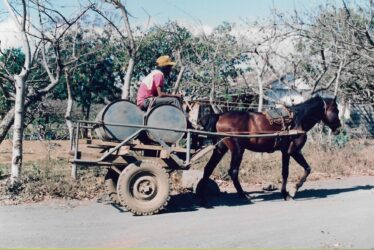
The woman I was interviewing said it was water. There was only one well in the entire area because of the geology, and it belonged to the mayor who sold the water in drums at cost. I asked how long a drum of water would last a family and was told they might have to make it last a fortnight or longer. I recall wincing and saying “well, more than literacy you need water”. The larger project the study was part of had demonstrated correlations between infant mortality and morbidity and distance from water source. The more water one used, for keeping clean and for boiling to help purity, the lower the rates of infant mortality and morbidity. I spoke to my research colleagues and said “we need to raise money to help build wells”. This near the end of my sabbatical and we agreed that the team should let the mayor know of our intentions and make it clear we weren’t undercutting him. He said the problem of water was acute and any help they could get would be welcome. After more than 18 months of money raising we had a modest sum, and Michele and I made a trip to Nicaragua to deliver the money.
On the first morning there we went out to the community with our friends and colleagues Peter and Jeff, and before we got to the community we saw a drilling rig. We asked what was going on, and were told there was a second rig down the road a kilometre and there was an information billboard. And that there was a meeting in the San Francisco neighbourhood that day. When we got to the meeting the mayor recognised us and said “these are the people whose idea it was”.
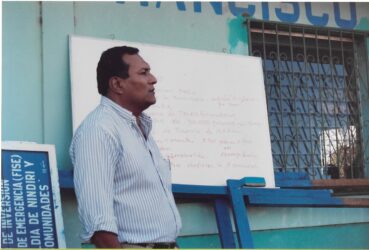
We had no clue the water was deep and through layers of volcanic rock. After Jeff’s visit to tell the mayor of our plan he had thought ahead to the next election. He’d gone to UNICEF with a project idea and had received $250,000 to create a water supply for 5 communities.
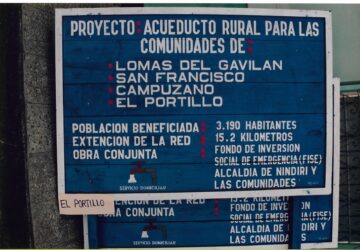
The mayor said that our money could be used to hook up some homes to the gravity feed water mains from the huge tanks up the hill. This was the first morning of the trip, after almost two years away. What were the odds, I wondered? I’d never have believed it without witnesses. But it also gave me a wry take on research at a time when universities were talking about “impact.” To the best of my knowledge nothing I have ever researched and published has made one iota’s difference to the world in terms of educational impact. But a single question that had nothing to do with my fieldwork protocol had triggered a set of events that led to an entire water supply. So, what was I doing?
By the time my sabbatical was finished, the end was nigh for the Sandinista government. The contra war had contributed. The government was scarcely able to do a thing by the end. Inflation was rampant. There was talk of corruption. I knew what it meant to be badly beaten. And for a long time I was haunted by the memory of attending an event in Monte Fresco to mark the end of a conscripted ‘tour of duty’ by young men from the community — who had been drafted to fight the Contra. The whole community was barely 500 people. There were 4 young men in wheelchairs. Two others had not made it home.
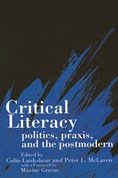
There was a book contract from SUNY Press for the critical literacy collection in my mailbox when I finally got back to work in January 1990. It was time to try to feel “at home” back home.
There was also a second book contract, which had come from out of left field. Prior to sabbatical I had worked on a project at the request of a local high school with a colleague and a consultant sociologist named Allan Levett. We had written a report and it had garnered some media attention, some of which was hostile to the school. While I was on sabbatical Allan had been approached by a publisher to write a short book that took the school study as a basis for talking about directions for New Zealand education in the 1990s. By the time I got back the contract deadline was 9 days away. I went to Allan and Vera’s house to write with Allan. We sat at his computer and worked up to 16 hours a day. The skin peeled from my palms from stress. We made the deadline and Going for Gold: Priorities for Schooling in the Nineties was published within a couple of months.
A month later the Sandinista Government was voted out (24 February 1990). Facing the defeat of the Nicaraguan experiment basically broke me. It was like a death, and I still grieve. I knew it was by no means only the effects of the Contra War that led to the defeat, even if that was a lot of it. The inequalities were still large. A large proportion of government leaders, politicians, and bureaucrats were, not surprisingly, middle class, and Pedro probably spoke for many when he said that “no government is any good for peasants.”
I fell rudderless pretty quickly. It wasn’t just the failure of a dream. My sabbatical had blown open a huge personal contradiction. On the one hand was the experience of activism in solidarity. I knew whose side I was on, or so I thought. On the other hand was the fact that this activism had begot ‘career.’ Even as a very small fish in a very big pond, I knew that I had tasted ‘interesting‘ and ‘exciting’ and that I now had small networks that could help me get enough traction to pick my own trajectory through ‘the world’. I wanted to be a collectivist, but I was also profoundly an individual. I realised that the whole Nicaraguan ‘praxis’ thing had allowed me to have it both ways. By the end of 1990 I was “not at home in the world” but also profoundly “not at home inside”. Unhappy at work and unhappy everywhere else, I drifted, lost heart, and lost my way.
It was time to try to make a fresh start, but I had no clue as to how to do that other than to take some time out and ‘drift — just try to stay reasonably ‘intact’ and see what came up. I resigned from Auckland University at the end of 1991 and became an accidental tourist of life. There was no plan; not even a sense of where to try to plan from.
Nevertheless there were some sabbatical academic outcomes:
Lankshear, C. (1989). Reading and Righting Wrongs: literacy and the underclass, Language and Education, 3 (3).
Lankshear, C. (1992). Literacy and Running Your Life: a Nicaraguan example, Language and Education, 5 (2).
Lankshear, C. and McLaren, P. eds. (1993) Critical Literacy: politics, praxis and the postmodern. Albany, NY: State University of New York Press.
Sandiford, P. and Lankshear, C. et al (1994). The Nicaraguan literacy crusade: how lasting were its effects?, Development in Practice, 4 1, 5 – 17.
Lankshear, C., Sandiford, P. et al (1995). Twelve years on: women and literacy in Nicaragua, The International Journal of Lifelong Education, 14 (2).
Lankshear, C. (1995). And where do we go from here?: Lifeless factories, dry streams and the new competition. Taboo: The Journal of Education and Culture, Vol 2 (Fall).



